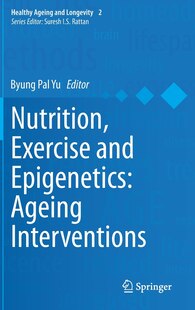Nutrition, Exercise and Epigenetics: Ageing Interventions
Epigenetics refers to an inheritable but reversible phenomenon that changes gene expression without altering the underlying DNA sequence. Thus, it is a change in phenotype without a change in genotype. The field of epigenetics is quickly growing especially because environmental and lifestyle factors can epigenetically interact with genes and determine an individual’s susceptibility to disease. Interestingly, aging is associated with substantial changes in epigenetic phenomena. Aging induces global DNA hypomethylation and gene-specific DNA hypermethylation due to the altered expression of DNA methyltransferases (DNMTs).
The evidence of the impact of epigenetics on aging is growing. And nutrition plays a key role on epigenetics through the life course. Thus, there are crucial reasons to focus on nutrition early in life.
It is clear that epigenetic alterations caused by aging may provide a milieu that can develop age-associated diseases such as cancer, cardiovascular diseases, neurocognitive diseases and metabolic diseases. Nutrition is one of the most important environmental factors that can modify epigenetic phenomena. Therefore, one might speculate that nutrition may delay the age-associated epigenetic change and possibly reverse the aberrant epigenetic phenomena that can cause age-associated diseases. Indeed, many nutrients and bioactive food components, which can affect one-carbon metabolism that can regulate methylation of DNA and histone or directly inhibit epigenetic modifying enzymes, are showing promising results in delaying the aging process and preventing age-associated diseases through epigenetic mechanisms.
And beyond nutrition, there is exercise. This is what this
book explains and it shows the foundations for better health. If it's "only" an issue of regulating methylation...where are the incentives?
